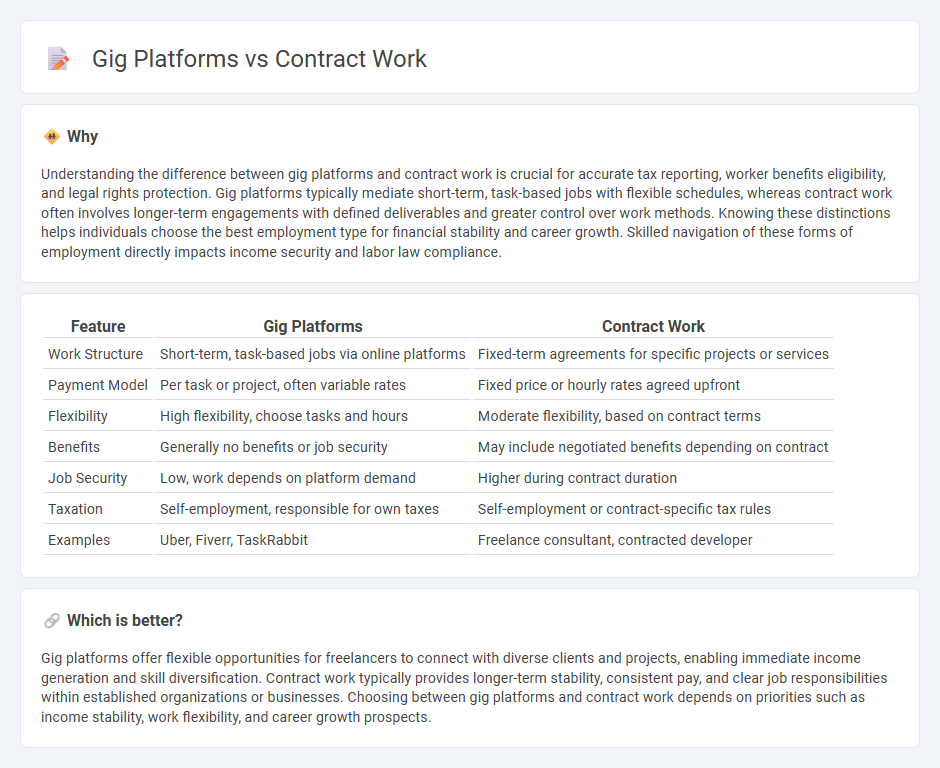
Gig platforms offer flexible, task-based opportunities suited for short-term engagements, enabling workers to choose projects aligned with their skills. Contract work typically involves longer-term commitments with defined roles and responsibilities, providing greater job stability and benefits. Explore how each employment type can fit your career goals and lifestyle preferences.
Why it is important
Understanding the difference between gig platforms and contract work is crucial for accurate tax reporting, worker benefits eligibility, and legal rights protection. Gig platforms typically mediate short-term, task-based jobs with flexible schedules, whereas contract work often involves longer-term engagements with defined deliverables and greater control over work methods. Knowing these distinctions helps individuals choose the best employment type for financial stability and career growth. Skilled navigation of these forms of employment directly impacts income security and labor law compliance.
Comparison Table
| Feature | Gig Platforms | Contract Work |
|---|---|---|
| Work Structure | Short-term, task-based jobs via online platforms | Fixed-term agreements for specific projects or services |
| Payment Model | Per task or project, often variable rates | Fixed price or hourly rates agreed upfront |
| Flexibility | High flexibility, choose tasks and hours | Moderate flexibility, based on contract terms |
| Benefits | Generally no benefits or job security | May include negotiated benefits depending on contract |
| Job Security | Low, work depends on platform demand | Higher during contract duration |
| Taxation | Self-employment, responsible for own taxes | Self-employment or contract-specific tax rules |
| Examples | Uber, Fiverr, TaskRabbit | Freelance consultant, contracted developer |
Which is better?
Gig platforms offer flexible opportunities for freelancers to connect with diverse clients and projects, enabling immediate income generation and skill diversification. Contract work typically provides longer-term stability, consistent pay, and clear job responsibilities within established organizations or businesses. Choosing between gig platforms and contract work depends on priorities such as income stability, work flexibility, and career growth prospects.
Connection
Gig platforms revolutionize employment by connecting freelancers and contractors with short-term, project-based jobs through digital marketplaces. Contract work thrives on the flexibility and accessibility offered by these platforms, enabling businesses to tap into specialized skills without long-term commitments. This dynamic fosters a growing gig economy where independent workers leverage online tools for income generation and career autonomy.
Key Terms
Independent Contractor
Independent contractors benefit from contract work by securing longer-term agreements that offer more predictable income and clearer client expectations compared to gig platforms, which often provide short-term, task-based opportunities with less income stability. Contract work usually involves formal agreements defining project scope, payment terms, and deliverables, enhancing legal protection and professional credibility. Explore how independent contractors can leverage contract work to build sustainable careers and maximize earning potential.
Flexibility
Contract work offers tailored flexibility with negotiated hours and project scopes, enabling professionals to align tasks with their personal schedules and expertise. Gig platforms provide immediate access to diverse short-term jobs, allowing workers to choose tasks on demand but often with less control over timing and continuity. Explore the benefits and challenges of each to find the ideal flexibility model for your career needs.
Platform Mediation
Contract work typically involves direct agreements between clients and freelancers, whereas gig platforms act as intermediaries that facilitate project matching, payment processing, and dispute resolution. Platforms like Upwork and Fiverr provide built-in tools to ensure trust and transparency, reducing risks associated with contract enforcement and enhancing workflow efficiency. Explore how platform mediation transforms the freelance economy by streamlining collaboration and securing transactions.
Source and External Links
What Is a Contract Job, and How Does It Work in 2025? - Upwork - A contract job involves hiring a worker for a specific job with a set period and fixed payment, providing flexibility and opportunities for both businesses and professionals.
Independent contractor (self-employed) or employee? - IRS - It explains how to determine whether a worker is an employee or an independent contractor, which affects tax withholding and employer responsibilities.
Contractor Opportunities | The Cigna Group Careers - Provides information on contract job opportunities that often allow flexibility, potential transition to full-time roles, and possible benefits through vendor employers.
 dowidth.com
dowidth.com